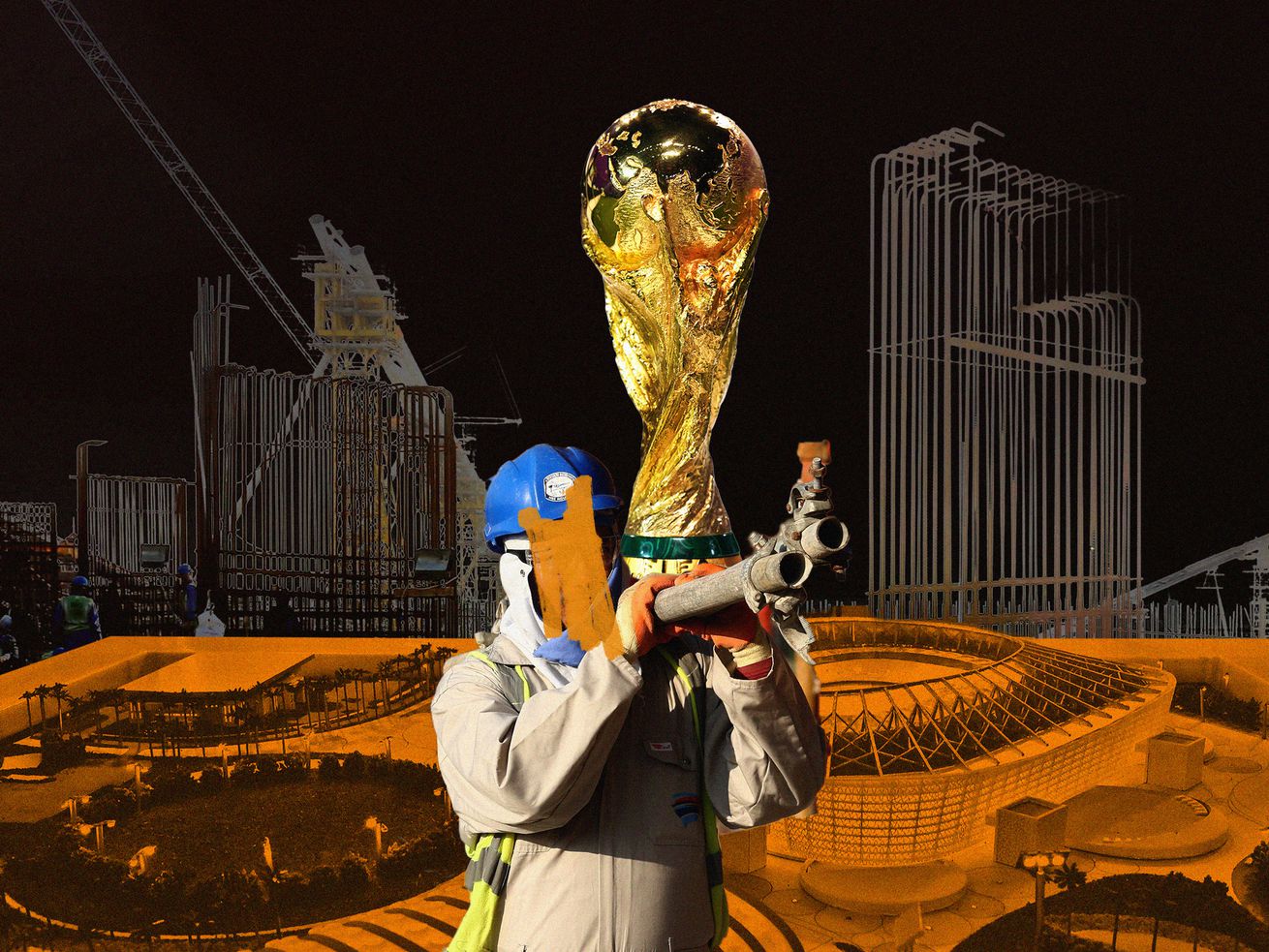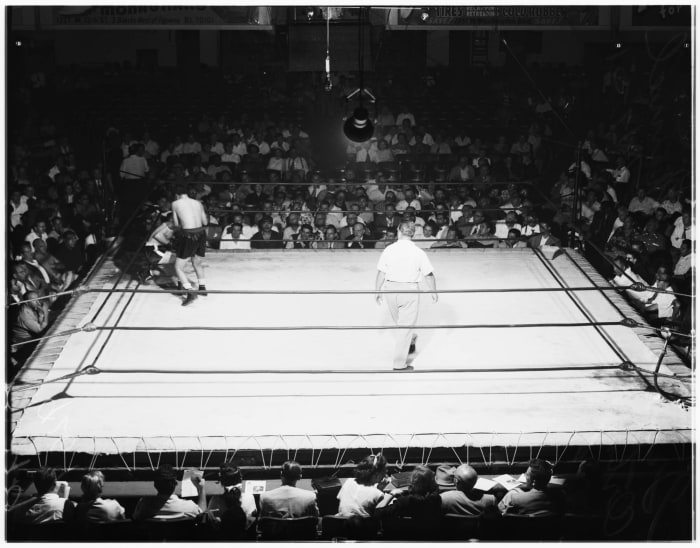Since FIFA awarded the 2022 World Cup to Qatar in 2010, the tournament has been ensnared in a tangled web of scandals.
The 2022 FIFA World Cup is set to kick off in Qatar on November 20, stirring excitement and anticipation in soccer fans around the world. But even if you’re not a die-hard soccer fan, you’ve probably heard something about the many controversies swirling around this year’s edition of the most famous sporting event in the world.
Since FIFA, the governing body for international soccer, awarded the 2022 World Cup to Qatar in 2010, the tournament has been ensnared in a tangled web of scandals. That web includes everything from allegations of corruption and bribery during the bidding process to host the tournament, to accusations that Qatar is using the event to “sportswash” its record of human rights abuses. According to an analysis by the Guardian, at least 6,500 migrant laborers have died while working on the eight stadiums that Qatar constructed or renovated for the games. Global tensions around the competition have been further inflamed by FIFA’s controversial decision to move it to the northern hemisphere’s winter to avoid Qatar’s infernal summer heat, a move that critics have seized on as proof that FIFA is bending over backward to accommodate an already-troublesome host.
And this isn’t the first time a World Cup has been caught up in geopolitical controversies.
The 2018 tournament in Russia raised questions about FIFA’s cozy relationship with authoritarian leaders like Russian President Vladimir Putin, and the 2014 World Cup in Brazil sparked an international outcry over the forced removal of tens of thousands of poor and working-class Brazilians to make room for new tournament-related infrastructure. Since at least 1934 — when the second World Cup took place in Benito Mussolini’s fascist Italy — soccer fans have had to temper their enthusiasm for the game with an awareness of unsavory political compromises that inevitably accompany the multibillion-dollar spectacle.
Given that approximately 3.5 billion people tuned in to the World Cup in 2018, it’s impossible to deny the tournament’s continued global appeal. The very sources of that appeal — the sweeping stakes that accompany 32 nations competing in a month-long tournament, the power of old rivalries, the possibility that a single goal could change a country’s fate — are the same things that make these controversies so intractable.
“I know lots of people who say horrible things about FIFA [but] who are still very excited about the coming World Cup,” said Ken Bensinger, an investigative reporter and the author of Red Card: How the U.S. Blew the Whistle on the World’s Biggest Sports Scandal. “I mean, I’m excited about the upcoming World Cup, even though I think it probably shouldn’t be in Qatar.”
For ascendant nations like Qatar, the benefits of hosting the World Cup are still very real. “Qatar is a small state, and for small states, the main objective in international affairs is visibility,” said Danyel Reiche, a visiting associate professor at Georgetown University Qatar, where he leads a research initiative on the political and economic legacy of the World Cup. “Apart from visibility, it’s also about having some influence in international affairs and being able to punch above [your] weight.”
But the increased international scrutiny that accompanies the tournament also creates significant political liabilities for hosts. As Reiche and his co-author Paul Michael Brannagan argue in their new book on the tournament, “[While] Qatar intends to use the 2022 World Cup to promote a positive image of the country abroad, the tournament has, in contrast, come to introduce and educate many global audiences to the state in largely negative terms.”
In Qatar’s case, said Reiche, the pros still appear to outweigh the cons. But as global awareness of the economic, ecological, and human costs of the tournament continues to spread, FIFA and future host nations will have to answer difficult questions about the tournament’s merit. And with Saudi Arabia reportedly eyeing a bid to host the 2030 tournament, these questions aren’t likely to disappear anytime soon.
Controversy 1: Qatar’s bid was marred by accusations of corruption and bribery
FIFA’s decision in December 2010 to award the 2022 tournament to Qatar caught the world off guard, with many fans expressing surprise — and more than a little doubt — that a desert monarchy whose soccer team had never qualified for a World Cup had legitimately beat out global sporting powerhouses that made bids to host the tournament, like the United States, Japan, and Australia.
But even before the decision was publicly announced, soccer fans had good reasons to doubt the integrity of FIFA’s bidding process. Just two months before FIFA was slated to announce the host for the 2018 and 2022 tournaments, the organization suspended two members of its 24-person executive committee — the entity tasked with choosing the host nations — who had been accused of offering to sell their votes. (Both men eventually received temporary bans from FIFA.)
These preliminary corruption allegations turned out to be only the tip of the trash heap for FIFA. In 2014, the UK-based Sunday Times reported on a trove of leaked emails and other documents suggesting that prominent Qatari soccer official and former FIFA executive committee member Mohammed bin Hammam had allegedly paid millions of dollars worth of bribes to FIFA officials. (Bin Hammam had already received a lifetime ban from FIFA in 2011 for other corruption charges.) A subsequent investigation into corruption allegations conducted by FIFA’s chief ethics investigator and former United States attorney Michael J. Garcia found evidence of serious irregularities in the bidding process but offered no conclusive proof that Qatari officials had used bribes to influence the outcome of the vote.
Yet FIFA’s troubles only deepened from there. In May 2015, the US Department of Justice unsealed indictments against nine FIFA officials, accusing the officials of racketeering, wire fraud, and money laundering in connection with a far-reaching scheme to sell broadcasting rights for the tournament. Soon after, authorities in Switzerland announced a parallel investigation into allegations of corruption in the bidding processes for the 2018 World Cup in Russia and the 2022 tournament in Qatar.
“I don’t think people had a lot of confidence in FIFA before any of this happened, and even going back to 2010, people were already beginning to doubt FIFA,” said Bensinger. “By the time the US criminal investigation became public in 2015, confidence just dropped off the bottom of the map.”
In the midst of the turmoil, FIFA’s longtime president Sepp Blatter abruptly announced his resignation, just days after winning reelection to a fifth term as the governing body’s leader. (Blatter was later charged with criminal fraud in Switzerland, but he was acquitted in July 2022.) Then, in April 2020, the Justice Department released fresh evidence suggesting that three FIFA officials accepted bribes from unnamed intermediaries to vote for Qatar.
The results of these inquiries have been mixed. Although investigators have uncovered extensive criminal wrongdoing within FIFA, they have yet to turn up a smoking gun proving that Qatari officials bribed FIFA officials, and Qatari officials have continued to deny any wrongdoing.
“We are 100% confident in the integrity of our bid,” said a spokesperson for Qatari’s Supreme Committee for Delivery & Legacy, the entity tasked with overseeing preparations for the tournament, in a statement.
Corrupt or not, FIFA’s choice of Qatar does seem to be a bit self-serving: Hosting the tournament in the Middle East gives FIFA an opportunity to expand its market share in the region, and Qatar’s deep-pocketed oligarchs are attractive business partners for FIFA’s future ventures.
Nevertheless, the slew of arrests, indictments, and investigations has decisively undermined the public’s confidence in FIFA and its Qatari hosts.
“I don’t think people think of Qatar as a very positive actor,” said Bensinger. “They’re not doing a good job of instilling the public’s confidence in them [as] a clean place to have a World Cup.”
Controversy 2: The tournament’s infrastructure has been built on the backs of low-paid migrant laborers
Even for resource-wealthy nations like Qatar, hosting the World Cup is an arduous logistical undertaking, requiring billions of dollars of investments in new stadiums, transportation infrastructure, and accommodations to serve the hundreds of thousands of fans who attend the tournament. But Qatar, which has spent nearly $220 billion on new infrastructure ahead of the tournament, has kept labor costs down by relying on an extensive — and deeply exploitative — network of low-wage migrant labor to prepare for the tournament.
The horrors of Qatar’s migrant worker system are no secret, and the dangerous conditions created by that system are not unique to the preparations for the World Cup. Until the late 2010s, the vast majority of Qatar’s roughly 2 million migrant laborers — who compose about 94 percent of the country’s total labor force — were employed through a notoriously coercive labor system known as the kafala (or sponsorship) system, which tethered workers to a sponsor through a series of legally binding contracts. Although Qatar has made some major reforms to the kafala system in recent years — such as ending the requirement that workers receive their sponsor’s approval before leaving the country or changing jobs — the remnants of that system still give employers an inordinate amount of power over workers’ lives.
As Qatar has ramped up its preparations for the World Cup, the consequences of this system have been increasingly deadly. In 2021, the Guardian reported that more than 6,500 workers from India, Pakistan, Nepal, Bangladesh, and Sri Lanka had died in Qatar since 2010. (A spokesperson for the tournament organizers said there have only been three work-related fatalities and 37 non-work-related deaths.) Meanwhile, workers interviewed by nonprofit groups like Amnesty International have reported enduring an array of abuses including wage theft, excessive working hours, dangerous working and living conditions, and physical and sexual abuse.
The slight upside is that the heightened international scrutiny that has accompanied the World Cup has forced Qatar to make some reforms to its migrant labor system. In addition to the reforms to the kafala system, the Qatari government has also established a new labor dispute committee, created a state-backed insurance and support fund for workers, and set the country’s first-ever minimum wage.
Nevertheless, human rights groups say that more reforms are needed. “Although Qatar has made important strides on labour rights over the past five years, it’s abundantly clear that there is a great distance still to go,” said Steve Cockburn, Amnesty International’s head of economic and social justice, in a statement. “With the World Cup looming, the job of protecting migrant workers from exploitation is only half done, while that of compensating those who have suffered abuses has barely started.”
Controversy 3: Qatar is under fire for using the tournament to “sportswash” its record of human rights abuses
“Sportswashing” — a term coined by human rights activists in the mid-2010s to describe efforts by repressive governments to use prestigious sporting events to burnish their international reputation — is seemingly everywhere these days. In the past year, the term has been used to describe everything from China’s hosting of the 2022 Winter Olympics to Saudi Arabia’s decision to fund an upstart professional golfing league, causing some commentators to worry that the term has become so overused that it’s now basically meaningless.
But there’s a strong case to be made that this year’s World Cup is a textbook example of sportswashing.
For decades, Qatar has been criticized by international human rights groups for laws curtailing the rights of LBGTQ people and women, in particular for provisions in the country’s penal code that criminalize sexual intercourse between people of the same sex. Although prosecutions under these provisions are relatively rare, LGBTQ Qataris continue to report widespread police harassment and intimidation. The World Cup’s organizers have indicated that LGBTQ fans will be welcome and safe at the tournament, but some Qatari activists have continued to say that they fear for queer visitors’ safety.
Qatar has a similarly poor record when it comes to freedom of expression. The country’s penal code criminalizes speech criticizing the emir, blaspheming against Islam, or spreading “false news,” and the government has weaponized these restrictions to punish critics and silence dissidents. In August 2021, the Qatar government charged seven Qatari citizens who had criticized the country’s newly restrictive voting laws with “using social media to spread false news.” The regime has also targeted independent journalists who traveled to the country to report on the working conditions of migrant laborers, and the government has imposed sweeping restrictions on journalists traveling to cover the World Cup, a move that human rights groups say will have a “severe chilling effect” on the media coverage of the event.
Yet even while sportswashing might explain one element of the Qatari government’s desire to host the World Cup, it’s important to recognize the limits of the concept.
“To think that a country like Qatar would invest big in a football tournament just to distract from some human rights violations — I don’t think this does justice to the complexity of the matter,” said Reiche. “There are a variety of reasons why Qatar invests in sports, starting with being visible as a small state, gaining influence in international affairs, and contributing to national security.”
Controversy 4: FIFA is massaging the numbers on its sustainability pledge
FIFA has promised that this year’s tournament will be the first carbon-neutral World Cup in the competition’s history. But researchers who’ve studied the tournament’s sustainability plan say that pledge relies on some creative accounting, to put it mildly.
This year’s tournament will be played in eight separate venues around Qatar: six newly constructed stadiums, one existing stadium, and one “temporary” venue that will be deconstructed and repurposed after the World Cup. To calculate the tournament’s total carbon footprint, explained Gilles Dufrasne, a climate researcher with Carbon Market Watch, the tournament’s organizers calculated the total emissions associated with the construction of all the stadiums, then divided that figure by the average lifespan of each stadium, estimated to be approximately 60 years. Because the World Cup lasts for only one month, organizers then concluded that the tournament was responsible for only one month’s worth of emissions spread across that 60-year estimated span — a tiny fraction of the actual emissions that resulted from building the stadiums.
“This probably underestimates the [tournament’s] emissions by about 1.4 megatonnes — or 1.4 million tons — and that’s quite a conservative estimate,” said Dufrasne, who recently authored a report on the problems with the tournament’s sustainability pledge. “Adding that to their existing estimate, their total footprint is closer to 5 megatonnes rather than the 3.6 megatonnes that they have announced.” (As a point of reference, the entire country of Uruguay produced an estimated 4.7 megatonnes of carbon in 2019.)
Similar problems also befall the organizers’ plan to purchase carbon offsets to meet their carbon neutrality pledge. To offset the tournaments’ total emissions footprint, organizers will need to purchase approximately 3.6 million credits, half of which they have agreed to buy from a group called the Global Carbon Council. (So far, they’ve purchased fewer than 350,000 credits, according to their public disclosures.) But despite its name, Global Carbon Council is not, in fact, an international institution. Instead, it’s based in Qatar and is connected to Qatari state-owned entities.
These ties to the Qatari government “raise serious questions about the independence of that standard,” said Dufrasne.
To add insult to injury, the credits that the World Cup organizers have purchased will fund “non-additional” renewable energy projects — meaning projects that would be developed regardless of whether or not they are supported by credits.
“The reality is that they’re basically sending money to a project that doesn’t need it,” said Dufrasne. “It’s just inaccurate to say that this compensates for any sort of emissions.”
Is the World Cup likely to change as a result of all these controversies?
The short answer: probably not.
Since 2015, FIFA has adopted a series of reforms designed to weed out corruption and increase transparency and accountability within the organization, but it’s still too early to know whether these reforms will have their intended effect. “I think that a lot of [the reforms] seem like decent ideas, but in exercise, they don’t mark a substantive change,” said Bensinger. “If you look at the current presidency of the current president [Gianni] Infantino” — who mysteriously moved to Qatar in October 2021 — “it just doesn’t look like a transparent organization.”
Players and fans have shown a renewed willingness to speak out about the controversies surrounding the tournament in small ways. In September, a group of European soccer federations that includes England, Germany, and France announced plans to have some members of their teams wear rainbow armbands during games to protest Qatar’s treatment of its LGBTQ citizens. Meanwhile, Denmark’s national team recently unveiled a “toned-down” design for its kits, intended to signal the team’s opposition to Qatar’s mistreatment of migrant laborers. Also in recent weeks, several major cities around France announced that they will not set up “fan zones” to allow spectators to watch the games in public, as they have in years past.
Ultimately, though, the primary obstacle to overhauling FIFA remains the World Cup’s unparalleled popularity.
“FIFA knows that no matter how badly it behaves and no matter how disgusted people are with the organization, every four years, everything’s forgotten,” said Bensinger. “It’s like the Catholic church: You can do whatever you want all week as long as you go to confession on Sunday. The World Cup functions that way for FIFA.”




